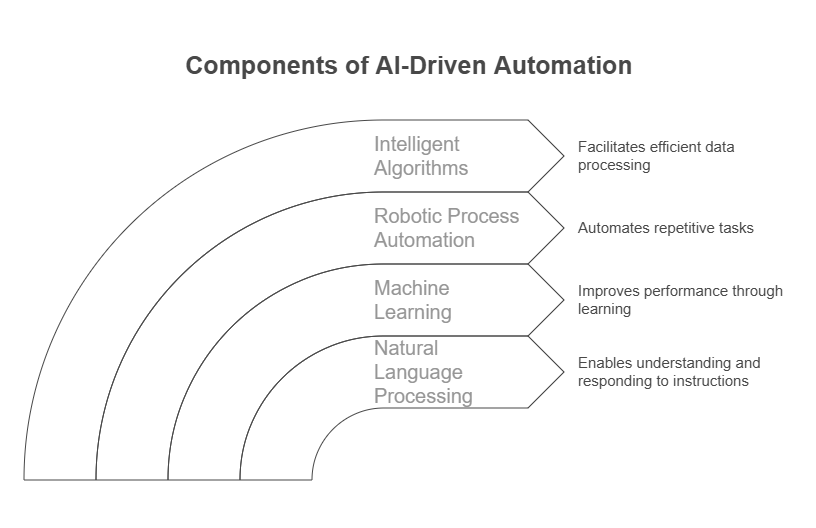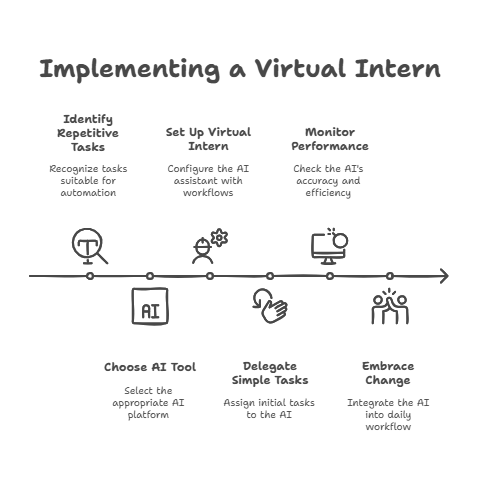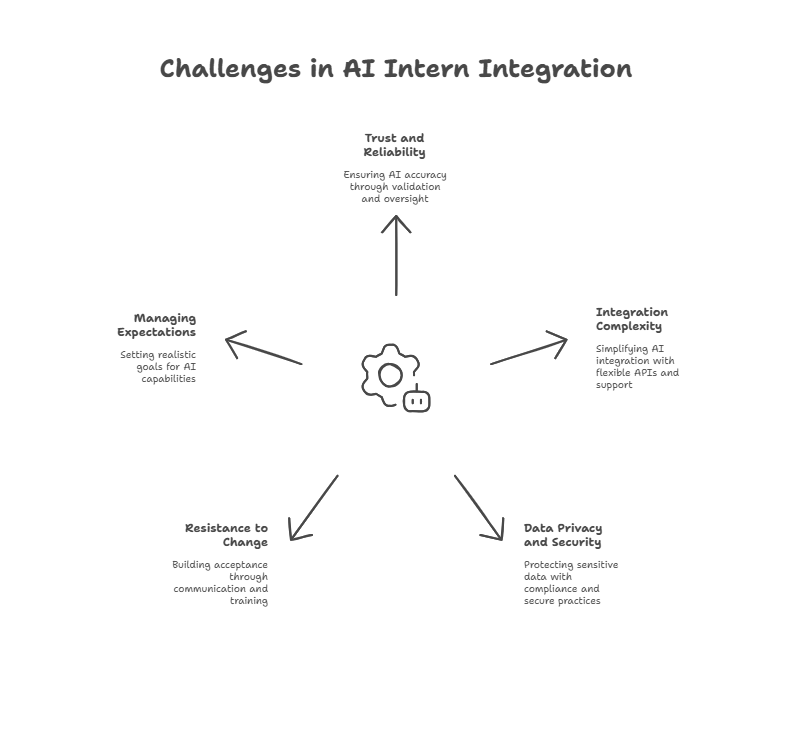Introduction: What is a Virtual Intern?
In today’s fast-paced work environment, professionals often find themselves overwhelmed by repetitive and mundane tasks that consume valuable time and energy. This is where the concept of a Virtual Intern powered by artificial intelligence (AI) comes into play. A Virtual Intern is an AI-driven assistant designed to take over routine, time-consuming tasks, allowing you to focus on more strategic and creative aspects of your work.
Unlike a traditional intern who requires training, supervision, and breaks, a Virtual Intern operates 24/7, efficiently handling tasks such as data entry, scheduling, email management, research, and basic content creation. By automating these activities, the Virtual Intern helps reduce human error, increase productivity, and free up mental bandwidth.
The technology behind Virtual Interns combines natural language processing, machine learning, and automation tools to understand instructions, learn from interactions, and improve over time. This makes them adaptable to various industries and roles, from marketing and customer support to finance and project management.
In essence, a Virtual Intern acts as a reliable digital teammate that supports your daily workflow, streamlines operations, and ultimately helps you achieve more with less effort. As AI continues to evolve, the capabilities of Virtual Interns will expand, making them indispensable assets in modern workplaces.
How AI Can Automate Repetitive Tasks
One of the primary strengths of a Virtual Intern lies in its ability to automate repetitive and mundane tasks that often bog down professionals. AI achieves this automation through a combination of technologies such as natural language processing (NLP), machine learning, robotic process automation (RPA), and intelligent algorithms.
For example, AI can process and organize large volumes of data much faster than a human, making tasks like data entry, sorting emails, or updating spreadsheets seamless and error-free. It can also handle scheduling by automatically managing calendars, setting reminders, and coordinating meetings based on your preferences and availability.
Natural language processing enables the Virtual Intern to understand and respond to written or spoken instructions, allowing it to draft emails, generate reports, or even conduct preliminary research by scanning through documents and online sources. Machine learning helps the AI improve its performance over time by learning from past interactions and adapting to your specific workflow.
By automating these repetitive tasks, AI not only saves time but also reduces the risk of human error, ensuring consistency and accuracy. This allows professionals to redirect their focus toward higher-value activities such as strategic planning, creative problem-solving, and decision-making.
In summary, AI-powered automation transforms tedious tasks into efficient, hands-off processes, making the Virtual Intern an invaluable tool for boosting productivity and streamlining daily operations.

Key Benefits of Using a Virtual Intern
Using a Virtual Intern powered by AI offers numerous advantages that can significantly improve your work efficiency and overall productivity. Here are some of the key benefits:
First, a Virtual Intern saves you valuable time by handling repetitive and mundane tasks such as data entry, scheduling, and email management. This allows you to focus on more important and creative aspects of your job, ultimately enhancing your output quality.
Second, AI-driven Virtual Interns operate around the clock without the need for breaks or downtime. This means tasks can be completed faster and outside of regular working hours, helping to meet tight deadlines and maintain continuous workflow.
Third, Virtual Interns reduce the likelihood of human error. By automating routine processes, they ensure consistency and accuracy in tasks like data processing, report generation, and information retrieval.
Fourth, they are highly scalable and adaptable. Whether you need assistance with a few simple tasks or complex workflows, a Virtual Intern can be customized to fit your specific needs and grow alongside your business.
Fifth, Virtual Interns can improve collaboration by integrating with various tools and platforms you already use, streamlining communication and task management within your team.
Lastly, employing a Virtual Intern can be cost-effective compared to hiring additional staff, as it eliminates expenses related to training, benefits, and office space.
In summary, a Virtual Intern enhances productivity, accuracy, flexibility, and cost-efficiency, making it a smart solution for modern workplaces looking to optimize their operations.
Common Boring Tasks That AI Can Handle
Virtual Interns excel at taking over repetitive, time-consuming tasks that many professionals find tedious. These tasks, while necessary, often distract from more meaningful and strategic work. Here are some common boring tasks that AI-powered Virtual Interns can efficiently manage:
Data entry and management is one of the most frequent tasks AI handles. Virtual Interns can input, organize, and update large volumes of data quickly and accurately, reducing errors and freeing up your time.
Email management is another area where AI shines. Virtual Interns can sort, prioritize, and even draft responses to routine emails, helping you maintain a clean inbox and respond promptly without getting overwhelmed.
Scheduling and calendar coordination are easily automated. AI can arrange meetings, send reminders, and resolve conflicts by analyzing your availability and preferences, saving you the hassle of back-and-forth communication.
Basic research and information gathering is also well-suited for AI. Virtual Interns can scan documents, websites, and databases to collect relevant information, summarize findings, or prepare reports, speeding up your decision-making process.
Content creation support, such as drafting simple reports, generating templates, or creating social media posts, can be handled by AI, providing a solid starting point that you can refine.
Other tasks include invoice processing, data analysis, customer support through chatbots, and monitoring project progress.
By delegating these routine tasks to a Virtual Intern, you can focus on higher-level responsibilities that require creativity, critical thinking, and personal interaction.
How to Get Started with a Virtual Intern
Getting started with a Virtual Intern is easier than you might think, and it can quickly transform the way you work. The first step is to identify the repetitive or time-consuming tasks in your daily routine that could be automated. This might include managing emails, scheduling meetings, data entry, or basic research.
Next, choose the right AI-powered Virtual Intern tool or platform that fits your needs. Many solutions offer customizable features tailored to different industries and job functions. It’s important to consider factors such as ease of use, integration with your existing software, and the level of automation provided.
Once you select a platform, spend some time setting up the Virtual Intern by defining workflows, inputting necessary data, and training it to understand your preferences. Most AI assistants improve over time as they learn from your interactions, so initial setup is just the beginning.
Start by delegating simple tasks to your Virtual Intern and gradually increase its responsibilities as you gain confidence in its capabilities. Monitor its performance regularly to ensure accuracy and make adjustments as needed.
Finally, embrace the change and use the time saved to focus on strategic projects, creative work, or personal development. With consistent use, a Virtual Intern can become an indispensable part of your daily workflow.

Integrating AI Interns with Your Workflow
Integrating AI interns into your daily workflow can significantly enhance productivity by automating repetitive tasks and allowing you to focus on more strategic activities. The key to successful integration is understanding which parts of your work can be automated and how AI can seamlessly collaborate with your existing tools and processes.
The first step is to analyze your current workflow—identify tasks that are time-consuming, repetitive, or prone to errors. Then, select the right AI tools that can easily integrate with your systems, such as your calendar, CRM, or project management platforms.
Next, configure your AI intern to automatically handle selected tasks like scheduling meetings, sending reminders, processing data, or generating reports. It’s also important to set up monitoring and reporting mechanisms to keep track of the AI’s actions and make adjustments as needed.
By integrating an AI intern into your workflow, you not only save time but also improve the accuracy and consistency of task execution. AI can operate 24/7, increasing efficiency and enabling faster responses to changing demands.
Example: Simple Task Automation in Python
Below is a sample Python script demonstrating how to automate sending email reminders for upcoming meetings by integrating an AI intern with a calendar (e.g., Google Calendar) and an SMTP server for email delivery.
python
import smtplib
from email.mime.text import MIMEText
from datetime import datetime, timedelta
# Example function to fetch upcoming events from a calendar (simulated here)
def get_upcoming_events():
# In practice, this would call the Google Calendar API or another calendar service
now = datetime.now()
events = [
{"title": "Client Meeting", "time": now + timedelta(hours=1), "email": "client@example.com"},
{"title": "Team Daily Standup", "time": now + timedelta(hours=3), "email": "team@example.com"},
]
return events
# Function to send an email reminder
def send_email(to_email, subject, body):
from_email = "your_email@example.com"
password = "your_email_password"
msg = MIMEText(body)
msg['Subject'] = subject
msg['From'] = from_email
msg['To'] = to_email
with smtplib.SMTP_SSL('smtp.example.com', 465) as server:
server.login(from_email, password)
server.sendmail(from_email, to_email, msg.as_string())
# Main logic to remind about events happening within the next hour
def remind_upcoming_events():
events = get_upcoming_events()
now = datetime.now()
for event in events:
if 0 <= (event["time"] - now).total_seconds() <= 3600: # events within the next hour
subject = f"Reminder: {event['title']}"
body = f"You have an upcoming event: {event['title']} at {event['time'].strftime('%H:%M')}."
send_email(event["email"], subject, body)
print(f"Sent reminder to {event['email']} for event '{event['title']}'.")
if __name__ == "__main__":
remind_upcoming_events()This simple script can be scheduled to run periodically (e.g., every 15 minutes) as part of your workflow to automatically remind you and your team about important meetings. In a real-world scenario, you would connect it to an actual calendar API and securely manage your credentials.
Examples of Virtual Interns in Different Industries
Virtual AI interns are transforming how businesses operate across various industries by automating routine tasks, providing intelligent assistance, and enhancing overall productivity. Here are some examples of how virtual interns are being used in different sectors:
1. Technology and Software Development
In tech companies, AI interns assist developers by automating code reviews, debugging, and generating documentation. They can also help manage project timelines by tracking progress and sending reminders about deadlines or meetings.
2. Marketing and Advertising
AI interns in marketing help with content creation, social media management, and data analysis. They can generate draft posts, analyze campaign performance, and suggest optimizations, freeing marketers to focus on strategy and creativity.
3. Healthcare
In healthcare, virtual interns support administrative tasks such as scheduling patient appointments, managing medical records, and sending reminders for medication or follow-ups. Some AI interns also assist in preliminary data analysis for research purposes.
4. Finance and Banking
AI interns in finance automate transaction monitoring, generate financial reports, and assist with compliance checks. They can also help customer service teams by answering common queries and guiding users through basic processes.
5. Education
Educational institutions use AI interns to support students and faculty by managing schedules, grading assignments, and providing personalized learning recommendations. They can also assist in organizing virtual classrooms and tracking attendance.
6. Retail and E-commerce
In retail, AI interns handle inventory management, customer inquiries, and order processing. They analyze sales data to forecast demand and suggest promotions, helping businesses optimize their operations.
Enhancing Productivity with AI Assistance
AI-powered virtual interns are revolutionizing productivity by automating mundane tasks, providing real-time insights, and enabling smarter decision-making. By integrating AI assistance into daily workflows, individuals and teams can focus more on high-value activities, reduce errors, and accelerate project completion.
One of the key productivity boosts comes from AI’s ability to handle repetitive tasks such as scheduling, data entry, and report generation. This not only saves time but also minimizes human error. Additionally, AI assistants can analyze large datasets quickly, uncovering trends and actionable insights that might be missed otherwise.
AI can also facilitate better collaboration by managing communication channels, summarizing meetings, and tracking project milestones. This ensures everyone stays aligned and informed without spending excessive time on administrative overhead.
Moreover, AI’s 24/7 availability means support is always on hand, whether it’s answering questions, troubleshooting issues, or providing recommendations. This continuous assistance helps maintain momentum and reduces downtime.
Example: Automating Task Prioritization with Python
Here’s a simple Python example demonstrating how an AI intern might help prioritize tasks based on deadlines and importance, helping users focus on what matters most.
python
from datetime import datetime
tasks = [
{"task": "Finish report", "deadline": "2025-06-28", "priority": 2},
{"task": "Email client", "deadline": "2025-06-26", "priority": 3},
{"task": "Team meeting", "deadline": "2025-06-27", "priority": 1},
]
def prioritize_tasks(tasks):
today = datetime.now().date()
# Convert deadline strings to date objects
for task in tasks:
task["deadline_date"] = datetime.strptime(task["deadline"], "%Y-%m-%d").date()
# Calculate days left until deadline
task["days_left"] = (task["deadline_date"] - today).days
# Sort tasks by priority (higher first) and then by days left (sooner first)
sorted_tasks = sorted(tasks, key=lambda x: (-x["priority"], x["days_left"]))
return sorted_tasks
if __name__ == "__main__":
prioritized = prioritize_tasks(tasks)
print("Tasks prioritized for today:")
for t in prioritized:
print(f"- {t['task']} (Priority: {t['priority']}, Deadline in {t['days_left']} days)")This script helps users quickly identify which tasks need immediate attention, improving time management and productivity.
Overcoming Challenges When Using AI Interns
While AI interns offer significant benefits, integrating them into your workflow comes with challenges that need to be addressed to maximize their effectiveness.
One common challenge is trust and reliability. AI systems may sometimes produce incorrect or incomplete results, which can lead to hesitation in fully relying on them. To overcome this, it’s important to implement validation steps and maintain human oversight, especially for critical tasks.
Another issue is integration complexity. AI interns need to work smoothly with existing tools and platforms, which can require technical expertise and customization. Choosing AI solutions with flexible APIs and strong support can ease this process.
Data privacy and security concerns also arise when AI interns handle sensitive information. Ensuring compliance with regulations and using secure data handling practices is essential to protect both your business and your clients.
Additionally, there can be resistance to change from team members who may fear job displacement or feel uncomfortable working alongside AI. Clear communication about AI’s role as a supportive tool, along with training and involvement in the integration process, helps build acceptance.
Finally, managing expectations is crucial. AI interns are powerful but not infallible; understanding their limitations and setting realistic goals ensures a productive partnership.
By proactively addressing these challenges through careful planning, transparent communication, and ongoing evaluation, organizations can successfully harness the full potential of AI interns.

Future Trends in AI Interns and Virtual Assistants
The future of AI interns and virtual assistants looks incredibly promising, with advancements poised to make them even more intelligent, adaptable, and integrated into our daily lives. Emerging trends include more natural and context-aware conversations, deeper integration with a wide range of software tools, and enhanced capabilities in understanding complex tasks.
We can also expect AI interns to become better at learning from individual user preferences and work styles, offering highly personalized assistance. Improvements in multimodal AI—combining text, voice, images, and even video—will enable richer interactions and more effective support.
Another exciting development is the rise of collaborative AI, where multiple AI agents work together or alongside human teams to tackle complex projects, share knowledge, and optimize workflows dynamically.
As AI interns evolve, ethical considerations and transparency will remain critical, ensuring these tools are used responsibly and fairly.
Example: Simple AI Assistant Predicting Next Task
Here’s a short Python example demonstrating a basic AI intern predicting the next task based on task history using a simple frequency count:
python
from collections import Counter
task_history = [
"email client",
"write report",
"email client",
"team meeting",
"email client",
"write report",
]
def predict_next_task(history):
task_counts = Counter(history)
most_common_task, count = task_counts.most_common(1)[0]
return most_common_task
if __name__ == "__main__":
next_task = predict_next_task(task_history)
print(f"AI intern predicts your next task might be: '{next_task}'.")This simple model helps the AI intern anticipate what you’re likely to do next, enabling proactive assistance.
Ethical Considerations in Using AI Interns
As AI interns become more integrated into workplaces, ethical considerations play a crucial role in ensuring their responsible use. Key concerns include privacy, transparency, bias, and accountability.
Privacy is paramount since AI interns often handle sensitive personal and business data. Organizations must ensure data is collected, stored, and processed securely, complying with relevant regulations like GDPR or HIPAA.
Transparency involves making it clear when users are interacting with AI rather than humans. This helps build trust and sets appropriate expectations about the AI’s capabilities and limitations.
Bias in AI systems can lead to unfair or discriminatory outcomes, especially if training data is unrepresentative or flawed. Continuous monitoring and updating of AI models are necessary to minimize bias and promote fairness.
Accountability means defining who is responsible for decisions or actions taken by AI interns. Clear policies should be in place to address errors or unintended consequences.
By addressing these ethical issues thoughtfully, organizations can foster a positive environment where AI interns enhance productivity without compromising values or trust.
Best Practices for Implementing AI Interns in Your Workflow
Successfully integrating AI interns into your workflow requires thoughtful planning and adherence to best practices. Start by clearly defining the tasks and goals you want the AI intern to assist with, ensuring alignment with your team’s needs. Choose AI tools that are compatible with your existing systems and offer flexibility for customization.
Training and onboarding are essential—provide your team with guidance on how to interact with the AI intern effectively and set realistic expectations about its capabilities. Regularly monitor the AI’s performance and gather user feedback to identify areas for improvement.
Maintain a balance between automation and human oversight to prevent over-reliance on AI and to catch potential errors early. Prioritize data security and privacy by implementing robust safeguards and compliance measures.
Finally, foster a culture of continuous learning and adaptation, as AI technologies evolve rapidly. By following these best practices, you can maximize the benefits of AI interns while minimizing risks.
AI: Your programming assistant


